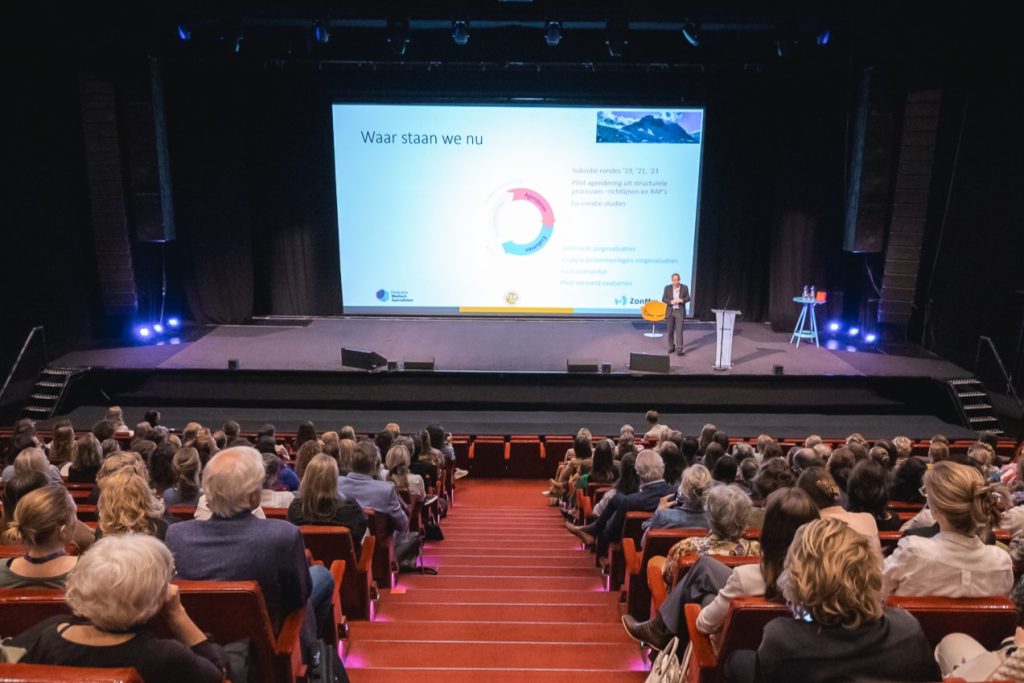Appropriate care is increasingly about making choices: what role does care assessment play in this? How can we share knowledge from research so that new ideas are put into practice as quickly as possible? What collaboration is required to make a healthcare evaluation successful? More than 400 healthcare professionals, researchers, policy makers and patient representatives from across the country gathered during the Healthcare Evaluation Conference on June 13 at the Beatrix Theater in Utrecht to share knowledge and experiences on the topic. The conference was organized by ZonMw, the ZE&GG Program and the Union of Medical Specialists.
Board Chairman Raphael Himmler (ENT) opened the day with an overview of developments in the field of healthcare evaluation. Many steps have already been taken to start a healthcare evaluation, but there is so much involved and the number of stakeholders involved makes it complicated. Himmler drew an analogy with a flock of starlings. “If even a group of 4,000 starlings can find a common path through good cooperation, we should be able to do the same.”
The “less is more” approach.
Due to rising costs, increased demand for care, and staff shortages, access to care is under pressure. This requires making choices. Using NVMDL’s Les-Is-More program, gastroenterologists Theis Schwartz and Jack Bergman show how a new perspective on evaluating care can contribute to reducing less helpful care. They reversed the process of evaluating care: first they immediately stopped some of the “less beneficial” care (but in a safe way), and then they evaluated its effects. They illustrate this using a concrete example: Project Icebreaker, where surveillance was halted for low-risk Barrett’s patients so that patients would not incur unnecessary burdens with gastroscopy and esophageal biopsy.
Healthcare evaluation is the first sport
During the conference, Els Visser demonstrated a completely different perspective for dealing with challenges. She survived a shipwreck, studied medicine and took a step toward a career as a professional triathlete. Her extraordinary journey reflects the challenges of healthcare evaluation, where persistence, solution-focus and collaboration are required to achieve results. ‘We all have our own journey. Sometimes things seem impossible, but if you follow your personal drive and work hard, you can achieve much more than you think.”
Practical examples
Some useful outcomes of evaluating care during the public program are discussed in the form of three practical examples. Surgery resident Heilke Brinkmann explained how Plastic study The circle of appropriate use has been completed. Brinkman evaluated whether the three tests that should be performed according to guidelines before treatment for stomach cancer are useful.
Psychiatric nurse Rob Henzen and nursing consultant Lisbeth de Boer shared their experiences and challenges in a large nursing quality improvement project which examined the effectiveness of freedom-restrictive interventions used at MUMC+.
Finally, clinical internal pharmacologist Kees Kramers, with patient Edagrit Humalda and researcher Sajaki Kooijmans, talked about Limoncello Research Project Which aims to find a solution to the overuse of medications in elderly people who have to deal with multiple healthcare providers. Idagret Humalda: “As a patient I have to pay a lot of attention because no one has a complete overview of my medications. I want to be seen as a whole person and not as a set of isolated medical problems. The LIMONCELLO project is supposed to improve medication control and reduce the number of associated admissions With medications.
Get rid of health care
Doctors Caregivers She provided a fun ending to the day with a serious message: “Do you sometimes feel like a hamster running on a wheel?” Get off your steering wheel and remove the health care hammer. Stop and take a closer look: How can we make work more fun and better? Are we doing the right things? Let’s share good ideas about health care with each other and implement them quickly, so we can get back to doing the things we started. Together we create healthcare.
See photos of the conference

“Coffee buff. Twitter fanatic. Tv practitioner. Social media advocate. Pop culture ninja.”











More Stories
Which can cause an increase in nitrogen.
The Central State Real Estate Agency has no additional space to accommodate Ukrainians.
The oystercatcher, the “unlucky national bird,” is increasingly breeding on rooftops.